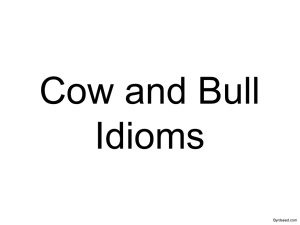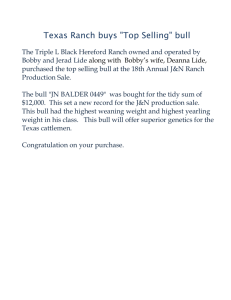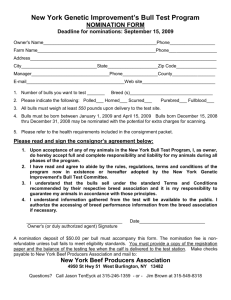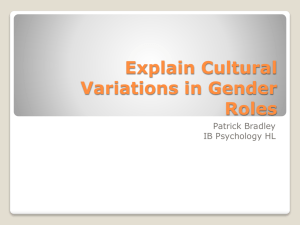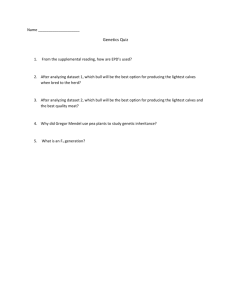Horayoth 1-5
advertisement
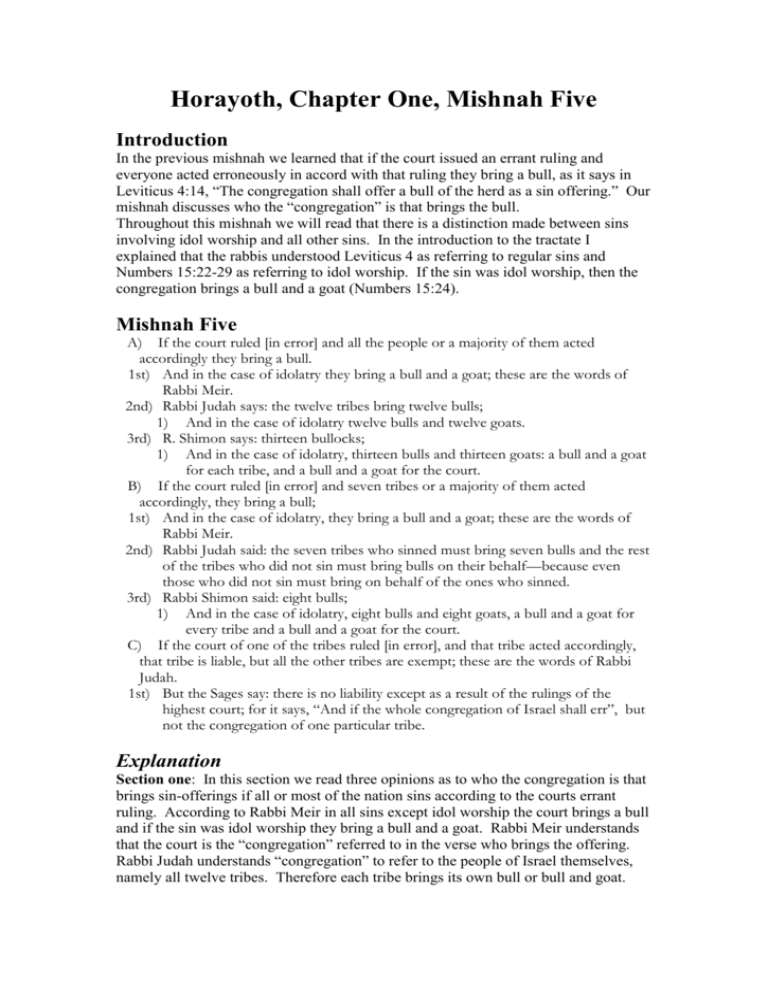
Horayoth, Chapter One, Mishnah Five Introduction In the previous mishnah we learned that if the court issued an errant ruling and everyone acted erroneously in accord with that ruling they bring a bull, as it says in Leviticus 4:14, “The congregation shall offer a bull of the herd as a sin offering.” Our mishnah discusses who the “congregation” is that brings the bull. Throughout this mishnah we will read that there is a distinction made between sins involving idol worship and all other sins. In the introduction to the tractate I explained that the rabbis understood Leviticus 4 as referring to regular sins and Numbers 15:22-29 as referring to idol worship. If the sin was idol worship, then the congregation brings a bull and a goat (Numbers 15:24). Mishnah Five A) If the court ruled [in error] and all the people or a majority of them acted accordingly they bring a bull. 1st) And in the case of idolatry they bring a bull and a goat; these are the words of Rabbi Meir. 2nd) Rabbi Judah says: the twelve tribes bring twelve bulls; 1) And in the case of idolatry twelve bulls and twelve goats. 3rd) R. Shimon says: thirteen bullocks; 1) And in the case of idolatry, thirteen bulls and thirteen goats: a bull and a goat for each tribe, and a bull and a goat for the court. B) If the court ruled [in error] and seven tribes or a majority of them acted accordingly, they bring a bull; 1st) And in the case of idolatry, they bring a bull and a goat; these are the words of Rabbi Meir. 2nd) Rabbi Judah said: the seven tribes who sinned must bring seven bulls and the rest of the tribes who did not sin must bring bulls on their behalf—because even those who did not sin must bring on behalf of the ones who sinned. 3rd) Rabbi Shimon said: eight bulls; 1) And in the case of idolatry, eight bulls and eight goats, a bull and a goat for every tribe and a bull and a goat for the court. C) If the court of one of the tribes ruled [in error], and that tribe acted accordingly, that tribe is liable, but all the other tribes are exempt; these are the words of Rabbi Judah. 1st) But the Sages say: there is no liability except as a result of the rulings of the highest court; for it says, “And if the whole congregation of Israel shall err”, but not the congregation of one particular tribe. Explanation Section one: In this section we read three opinions as to who the congregation is that brings sin-offerings if all or most of the nation sins according to the courts errant ruling. According to Rabbi Meir in all sins except idol worship the court brings a bull and if the sin was idol worship they bring a bull and a goat. Rabbi Meir understands that the court is the “congregation” referred to in the verse who brings the offering. Rabbi Judah understands “congregation” to refer to the people of Israel themselves, namely all twelve tribes. Therefore each tribe brings its own bull or bull and goat. Rabbi Shimon agrees in essence with both Rabbi Judah and Rabbi Meir: each tribe brings its own bull (or bull and goat) and the court brings one as well, bringing the total to thirteen. Section two: If only seven of the tribes sin according to the errant ruling, but these seven tribes do not add up to a majority of all of Israel, or a majority of each of the seven tribes sins, Rabbi Meir still holds that the court brings a bull or bull and goat. Rabbi Judah also holds that all twelve tribes still bring a bull, even though only seven sinned. Even the tribes that did not sin are responsible to ask for atonement for those that did sin. Rabbi Shimon, however, holds that only the tribes that actually sinned bring the sacrifices, as well as the court. Section three: If the high court of one of the individual tribes ruled in error and that tribe acted according to its ruling, that tribe is held accountable and must bring a bull, according to Rabbi Judah. Note that if the high court of the entire nation had ruled in error, but only one tribe had followed the ruling, these laws would not be in effect (the individuals who sinned would therefore be regarded as individual sinners and not treated as a collective). The Sages disagree. According to them all of these laws only apply in the case of the high court of the nation. The verse states that “the whole congregation of Israel” must sin, or at least a majority thereof. Therefore, the ruling court must also be the court of all of the congregation of Israel.

